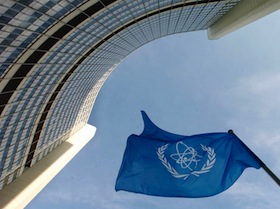IAEA Gives New Details of Iran Nuclear Weapons Work
Featured Image
Today's top nuclear policy stories, with excerpts in bullet form.
Stories we're following today: Wednesday, May 25, 2011.
Watchdog Finds Evidence That Iran Worked on Nuclear Triggers - David Sanger and William Broad in The New York Times [link]
- The [IAEA] revealed for the first time on Tuesday that it possesses evidence that Tehran has conducted work on a highly sophisticated nuclear triggering technology that experts said could be used for only one purpose: setting off a nuclear weapon.
- The agency gave some details in Tuesday’s report on work that was apparently done on how to trigger a nuclear device, dating back to late 2003. “The agency has not described these experiments to this detail before,” said Olli Heinonen, the agency’s former chief inspector.
- The Stuxnet may have now run its course. David Albright, president of the Institute for Science and International Security, a private group in Washington that tracks nuclear proliferation, analyzed the I.A.E.A. report and concluded that the jump in monthly production of enriched uranium was “the highest level that Iran has ever achieved.”
White House Threatens to Veto Defense Bill - Associated Press
- The White House threatened on Tuesday to veto a defense bill, fiercely objecting to provisions limiting President Barack Obama's authority to reduce the nation's nuclear arsenal and decide the fate of terror suspects.
- The bill includes a provision that would prohibit providing money to the administration for removing nuclear weapons from operation unless it reported to Congress on how it planned to modernize the remaining arsenal. The bill also says the president may not change the target list or move weapons out of Europe until he reports to Congress.
- The administration said it objected to the bill's onerous conditions on its ability to implement the [New START] treaty. The White House also said the legislation "raises constitutional concerns as it appears to encroach on the president's authority as commander in chief to set nuclear employment policy — a right exercised by every president in the nuclear age from both parties."
For expert analysis of the bill and the veto threat, see Nukes of Hazard and All Things Nuclear.
Group Collects Enough Signatures to Fight Nuclear Components in KC Plant - Lynn Horsley in The Kansas City Star
- A group seeking to prohibit manufacturing of nuclear components in a plant being constructed in Kansas City has gathered enough signatures to put its proposal on the November ballot.
- They argue that continued production of nuclear weapons components risks toxic chemical contamination of the grounds, employees and watershed. They still want the facility to be built — but want it used instead for environmentally progressive technologies and manufacturing.
- But some council members have suggested they have concerns about whether the ballot proposal is even lawful. They say the nuclear components plant is needed for the nation’s defense and to preserve more than 2,000 high-paying manufacturing jobs.
Missile Defense Cooperation: Seizing the Opportunity - Tom Collina of the Arms Control Association [link]
- Cooperation with Russia would strengthen U.S. security by enhancing our capabilities to detect a potential missile launch from Iran.
- The United States can and should make a political commitment in the strongest possible terms that it will not target its ballistic missile interceptors against Russian missiles.
- Russia needs to be open to solutions that do not require the advice and consent of two-thirds of the Senate.
- Striking a deal on missile defense cooperation could be a game-changer with the potential to unlock the door to the next round of negotiations with Russia on nuclear arsenal reductions, including tactical weapons, and further strengthen joint nonproliferation and counter-proliferation efforts.
Syria Site was "Very Likely" an Atom Reactor": UN Agency - Fredrik Dahl and Sylvia Westall in Reuters [link]
- The confidential report by the International Atomic Energy Agency (IAEA) threw independent weight behind U.S. allegations that Syria was secretly building a reactor at the Dair Alzour site in the desert, possibly with military aims.
- Saying Dair Alzour was a military, non-nuclear site, Syria has for nearly three years refused to allow U.N. inspectors to revisit the site destroyed by Israel [in 2007].
Time for U.S. to End Nuclear Test Explosions Worldwide - Col. Richard Klass and Dr. Ira Helfand in The Times Record
- Ending the explosive testing of nuclear weapons will make America safer, while failing to ratify the Comprehensive Test Ban Treaty has serious negative consequences.
- U.S. nuclear weapons have been certified reliable through non-nuclear tests and computer simulations. A ban on nuclear testing will only affect rogue nations and their nuclear weapons expansion programs.
- With no need or desire to test nuclear weapons and a clear national security interest in preventing other countries from doing so, the CTBT is a common-sense treaty.
The Cartoon Guide to Surviving a Nuclear Bomb Test - Jared Keller of The Atlantic [link]
- During atomic tests in Nevada, the Atomic Energy Commission attempted to placate nervous citizens with ridiculous cartoons.




